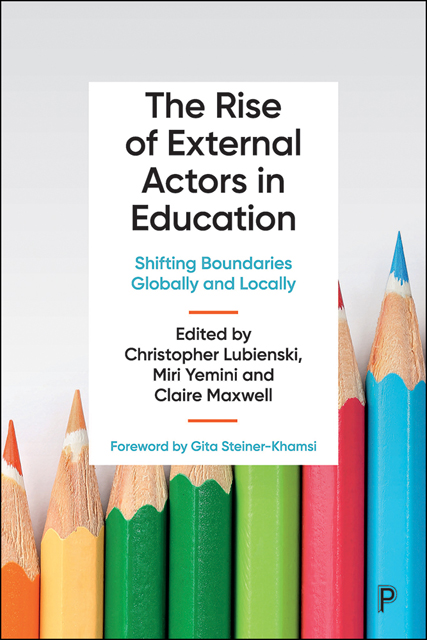Book contents
- Frontmatter
- Contents
- List of figures and tables
- Notes on contributors
- Foreword
- Introduction
- 1 Collective parental involvement: an in-between actor
- 2 When teachers become the external actor: private tutoring and endogenous privatisation in Cambodia
- 3 Cross-sectoral alliances in charter schools: the role of boards of directors from for-profit and non-profit sectors
- 4 A communitarian framework for understanding the relations between schools and NGOs
- 5 PISA for sale? Creating profitable policy spaces through the OECD’s PISA for Schools
- 6 Historical reconfigurations of internal/external actors in Danish educational testing practices
- 7 A short history of external agency involvement within education in contemporary Poland
- 8 New philanthropy in the heterarchical governance of education in Brazil
- 9 Venture philanthropy and the rise of external actors in Australian education
- 10 Power struggle in education policy change: the role of knowledge actors in structural reforms in Chile
- Conclusion: Complexity and intentionality of external actors in education
- Index
8 - New philanthropy in the heterarchical governance of education in Brazil
Published online by Cambridge University Press: 13 October 2022
- Frontmatter
- Contents
- List of figures and tables
- Notes on contributors
- Foreword
- Introduction
- 1 Collective parental involvement: an in-between actor
- 2 When teachers become the external actor: private tutoring and endogenous privatisation in Cambodia
- 3 Cross-sectoral alliances in charter schools: the role of boards of directors from for-profit and non-profit sectors
- 4 A communitarian framework for understanding the relations between schools and NGOs
- 5 PISA for sale? Creating profitable policy spaces through the OECD’s PISA for Schools
- 6 Historical reconfigurations of internal/external actors in Danish educational testing practices
- 7 A short history of external agency involvement within education in contemporary Poland
- 8 New philanthropy in the heterarchical governance of education in Brazil
- 9 Venture philanthropy and the rise of external actors in Australian education
- 10 Power struggle in education policy change: the role of knowledge actors in structural reforms in Chile
- Conclusion: Complexity and intentionality of external actors in education
- Index
Summary
Introduction
New philanthropy is now actively engaged in all education contexts; from teaching in classrooms to policymaking, foundations are increasingly influential ‘external actors’. In some countries, as in Brazil, its work is now so intertwined with the state that boundaries between sectors are blurred and opaque. These new interactions are giving rise to a network governance or ‘heterarchical governance’ (Jessop, 2011) in which philanthropic actors have become fundamental to explanation of education policy changes in the past decade (Olmedo, 2016; Ball et al, 2017). At the same time, boundaries between the market and the third sector, or between profit and non-profit activities, are also becoming blurred. Referred to as ‘new philanthropy’, large foundations are now characterised by the use of business sensibilities, searching for impact with measurable returns and aiming to disrupt and reform entire sectors (Ball et al, 2017). Furthermore, new philanthropy in Brazil is characterised by having moved away from service delivery to focus on advocacy and participate in education governance to shift education policies and practices (Adriao et al, 2012; Avelar, 2020).
This chapter analyses how new philanthropy is enacting discursive, relational, and institutional activities within heterarchical structures of governance to change how education is conceived and done in Brazil. Here, the example of an advocacy group, the Mobilisation for the National Learning Standards (MNLS), is presented. This group brought together several foundations and individuals working in public and private organisations to advocate for a standardised curriculum for the country. The case illustrates how new philanthropy, traditionally an ‘external actor’, has executed different types of work to construct an influential network that cuts through boundaries between public and private, which enabled participation in the formulation of the Brazilian curriculum. The Brazilian case is particularly relevant as one of the largest middle-income economies and a leading contributor to global philanthropic flows; its philanthropic sector is among the ten largest in the world (OECD, 2018). The case is also relevant given the dominance in Brazil of corporate actors and a focus on disrupting the entire education sector through participation in policymaking and governance. However, despite the empirical setting of Brazilian institutions, this chapter analyses networks, policies, and discourses that surpass national borders.
- Type
- Chapter
- Information
- The Rise of External Actors in EducationShifting Boundaries Globally and Locally, pp. 150 - 166Publisher: Bristol University PressPrint publication year: 2022

